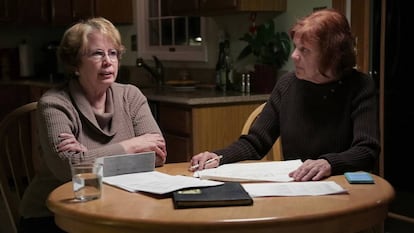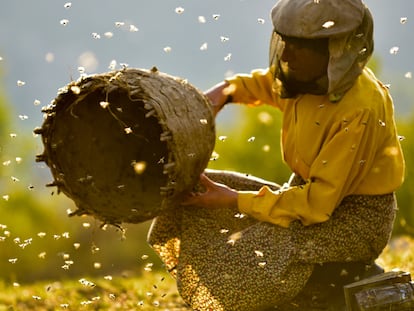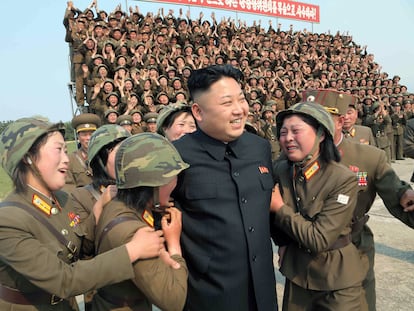So long to the golden age of platform documentaries
The audiovisual standardization driven by the algorithm casts a shadow over a genre that has experienced a qualitative boom in recent years because of streaming
In all but a decade, the boom in platform documentaries has gone from resembling a rich promised land to an overpopulated macro-farm rife with uninteresting content. The success of award-winning productions such as Icarus, American Factory and My Octopus Teacher was followed by unremarkable releases or expensive series like Harry & Meghan. Investing in documentaries, most of which having a journalistic slant, was certainly one of the brightest ideas brought about by streaming. Since the budgets were significantly lower than with fiction productions, it was possible to embrace a genre capable of exploring essential issues, ranging from the consequences of climate change to the existential threat posed by technological giants. Consequently, numerous users decided to go one step further and pay for content on the basis of this focus on reality.
Documentary platforms, particularly the mainstream ones, Netflix, Amazon Prime Video and HBO, are now in crisis. Previously audacious visions of the world are now being standardized with a popularization of themes and language. Immediate results have become the sole measure – or at least the main one - as the algorithm has begun to take command. Where there was once extensive research work and a fresh approach, there is now a tendency to use simple and mimetic formulas. The omnipresent true crime programs, which seem to be based on literally any type of criminal occurrence, and the lives of celebrities are the main topics of a genre that has suddenly stagnated, not in quantity, but in quality.
The beginning of the demise began in 2020 after the success of series such as the truculent Tiger King, dealing with the private zoo industry in the U.S., and The Last Dance, about Michael Jordan’s Chicago Bulls, whose deployment of media, interviews and historical archives turned a close-up look at a sports legend into a riveting spectacle. Not so long before that, between 2015 and 2018, the critically acclaimed crime investigation series Making a Murderer, The Jinx and The Staircase and, in another category, Wild Wild Country, on the controversial Indian guru Osho, rocked the global scene.
“In Spain, an industry opportunity that didn’t exist was generated”, says Elías León Siminiani, director of outstanding investigative series such as El caso Asunta, El caso Alcàsser and 800 metros. “We worked for a year and a half on the series about the murder of the Alcàsser girls and that alone marked a huge difference,” says Siminiani, for whom the “seminal” true crimes of a decade ago were inspired by the new form of journalism, “particularly [Gay] Talese and [Norman] Mailer”, and by a film that is central to understanding a new metalanguage, where the research becomes part of the content. “The Thin Blue Line, by Errol Morris, introduced the noir treatment to documentaries and the idea of speculation, of the investigation itself as content. This kind of amateurism of the investigations aroused the audience’s interest because it made them feel like a journalist-investigator.”
Series like The Keepers (2017), about a nun murdered in Baltimore, are the flagships of this new and successful formula. “The documentary boom reaped its rewards, but it also generated the demand that has culminated in the current situation. For me, Tiger King now represents the fast food of documentaries by placing entertainment as a priority objective ahead of any other consideration. Even so, I believe that there are still examples of creativity and that has allowed us to work with a leverage that would have been inconceivable ten years ago. That’s the good part,” concludes Siminiani.
“Documentaries have enabled platforms to achieve quality in a way that is cheaper than fiction series,” says David Trueba, director of the docuseries on the Pujol family, La Sagrada Familia. “The problem is when quality is no longer that important to obtain that distinction and only popularity takes precedence. The platforms were conceived from quality series made for subscribers, but by reverting to the demands of the audiences, immediate capture has become a priority and quality has been reduced. It turns its back on something that is particular and different because it’s not an instant success, forgetting that over the long term that is what remains. And then there’s the way of referring to cinema and television as ‘audiovisual content’, which implies a significant degradation.”
The perils of the macro content farm are evident in the latest Oscar for the HBO documentary Navalny, on the poisoned and imprisoned Russian dissident Alexei Navalny, riddled with shoddy resources, hollow testimonials and poor visuals. An example in the contrary comes to Spanish theaters this week: De Humani Corporis Fabrica was one of the films that made an impact at the last Cannes Film Festival. The fascinating (not for the faint hearted) journey into the human body by the ever-conscientious filmmakers Verena Paravel and Lucien Castaing-Taylor, members of Harvard’s Sensory Ethnography Lab, follows a great documentary tradition that naturally has its place in festivals such as the recently held Documenta Madrid and Pamplona’s Punto de Vista, at the end of March. In Madrid, Documenta Pro offered a series of talks for a sector that continues to “gain ground in Spanish cinema”. The “richness and diversity” of a genre that breaks away from simplifications was highlighted at these round tables.
“I like to think of a documentary as a fundamental orientation towards knowledge, rather than as a form,” says Manuel Asín, artistic director of Punto de Vista and coordinator of the film area at the Círculo de Bellas Artes in Madrid. “Many films and audiovisual products have this, including what we consider to be documentaries. But they aren’t the only ones. For instance, a big part of experimental cinema also takes this orientation. And all autobiographical cinema, which represents self-awareness. Indeed, every form of biography, even if it adopts the guise of fiction, retains a remnant of this orientation, and we know how central the biographical aspect is in fictional cinema or in series. This is the origin of all those debates about the limits between documentary and fiction, which are purely formal limits. The platforms, just like the television channels or the more conventional documentary production companies, are quite keen on keeping the debate within the formal confines, since their intention is to format the product, making it serializable, reproducible and mimetic.”
This year’s Pamplona festival was brought to a close with the screening of La Montagne infidèle, a forgotten film by Jean Epstein shot in 1923, at the time of the Mount Etna eruption, that was revived a few months ago by the Filmoteca de Cataluña. The overwhelming beauty of this centenary documentary accompanied a retrospective of German director Peter Nestler, who, at the age of 86 and with more than sixty documentaries to his name, exemplifies two essential qualities for the genre: perseverance and humility.
Nestler, often alongside his wife, Zsóka Nestler, has worked relentlessly on issues concerning his country’s working class or historical memory.
Die Judengasse, a 1980s film that was inexplicably censored on television in Germany, explored the Jewish traces in the city of Frankfurt, which date back to the Middle Ages and are still visible today despite being ravaged by Nazism.
Accused of being a communist, Nestler settled in Sweden at the end of the sixties, where he pursued his no-frills filmmaking, in search of the voice of the “true witnesses” and historical amnesia. “I don’t have the truth, but I have sought it,” the filmmaker said in Pamplona. When asked what the real goal of a documentary is, he replies: “To challenge the audience, to break their resistance.” One only has to take a look at the plethora of content on offer on the platforms to understand that the algorithm does not share these ideals.
Sign up for our weekly newsletter to get more English-language news coverage from EL PAÍS USA Edition
Tu suscripción se está usando en otro dispositivo
¿Quieres añadir otro usuario a tu suscripción?
Si continúas leyendo en este dispositivo, no se podrá leer en el otro.
FlechaTu suscripción se está usando en otro dispositivo y solo puedes acceder a EL PAÍS desde un dispositivo a la vez.
Si quieres compartir tu cuenta, cambia tu suscripción a la modalidad Premium, así podrás añadir otro usuario. Cada uno accederá con su propia cuenta de email, lo que os permitirá personalizar vuestra experiencia en EL PAÍS.
¿Tienes una suscripción de empresa? Accede aquí para contratar más cuentas.
En el caso de no saber quién está usando tu cuenta, te recomendamos cambiar tu contraseña aquí.
Si decides continuar compartiendo tu cuenta, este mensaje se mostrará en tu dispositivo y en el de la otra persona que está usando tu cuenta de forma indefinida, afectando a tu experiencia de lectura. Puedes consultar aquí los términos y condiciones de la suscripción digital.
More information
Archived In
Últimas noticias
Most viewed
- Oona Chaplin: ‘I told James Cameron that I was living in a treehouse and starting a permaculture project with a friend’
- Reinhard Genzel, Nobel laureate in physics: ‘One-minute videos will never give you the truth’
- Sinaloa Cartel war is taking its toll on Los Chapitos
- Why the price of coffee has skyrocketed: from Brazilian plantations to specialty coffee houses
- Chevy Chase, the beloved comedian who was a monster off camera: ‘Not everyone hated him, just the people who’ve worked with him’












































